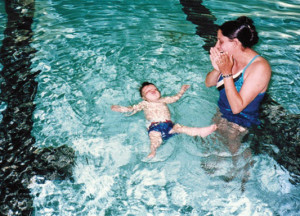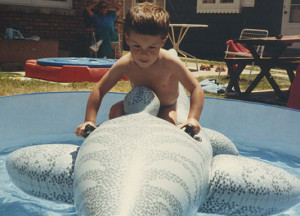Feeding an Olympian – Constant nutrition can improve your workout

What does it really take to be an Olympian?
A ton! Becoming an Olympian or Olympic champion is generally a long journey with many turns, hazards, roadblocks, and distractions. Some get there with ease and talent; most get there through a gritty and almost insane amount of motivation more often fueled by the hatred of losing than by the love of winning.

 My road to the Olympics started before I was born. My mother, a collegiate swimmer, swam everyday of her pregnancy. I wasn’t but six weeks old when I had my first experience in a pool. As a result, being in water has been a natural place for me to feel comfortable. Swimming started very basically and made a natural progression up the ladder as I matured and became more engrossed in the sport.
My road to the Olympics started before I was born. My mother, a collegiate swimmer, swam everyday of her pregnancy. I wasn’t but six weeks old when I had my first experience in a pool. As a result, being in water has been a natural place for me to feel comfortable. Swimming started very basically and made a natural progression up the ladder as I matured and became more engrossed in the sport.
I joined my first swim team at the age of four. Around the corner from the house where I grew up in Wisconsin, there was a pool with a team my sister and I were on every summer. I swam at a local club, went on to compete for my high school, and then to train under famed coach Eddie Reese at the University of Texas. I now swim in the professional ranks, though I’m still training at UT. The incredible part is that all those early years swimming at the local pool, hundreds of meets, thousands of practices, and countless miles swam really just cruised by. Until I was older, I never really thought about the time I spent dedicating myself to swimming; it was just something that I loved to do.
At one point during an early part of my career, something amazing happened: I realized the direct correlation between going to practice, working hard, and swimming fast. Up until my freshman year of high school, I had never swum year round. Once I began to solely focus on swimming (outside of schoolwork, that is), I started improving exponentially. This was like back when I thought about doing both basketball and swimming in high school. My parents told me to choose one thing and do it to the best of my abilities—some of the best advice they’ve ever given me.
About this time, my mom read an article about sports nutrition and got the bug to help me fuel for success. It wasn’t long before I went to every swim meet with a lunch bag full of snacks to keep me fueled up and ready to race. My performance at meets literally skyrocketed when I began nourishing myself throughout the competition; my workouts needed the same kind of diet. My mom would pack me two lunch bags everyday: one for lunch and another to eat after school before practice. Inevitably, the second bag’s goods would turn into snacks between classes, which I soon learned helped my performance in school, too!
As a high school swimmer—and even as a college athlete—meets can be very long. Sometimes the whole thing can last three to four hours, sometimes even longer. Most swimmers don’t eat for at least an hour before the meet starts, eventually causing low blood sugar and an even lower energy level. Neither are good for tiptop results.
We started simply; if it’s too difficult to get ready and pack, we’re less likely to try. Make it easy on yourself, at least while you’re first getting into it. We began with basics; string cheese, Wheat Thins, rice cakes, granola bars, orange slices, banana, pb&j sandwiches, apple slices, dried cereal, instant oatmeal, prunes, dried cranberries, dried mango, Fig Newtons, whole grain bagel, almonds, hard-boiled eggs, single serving yogurt, turkey sandwiches, energy bars, and sometimes even a little Tupperware of homemade baked beans.
The trick for me was to constantly snack. At the outset, there were a couple of races where I obviously ate too much and felt a bit bloated heading up to the starting block. Soon I learned to eat a little bit of a lot of different things throughout the meet, or easy snacks like four crackers and a couple of apple slices. As I went along it became easy for me to weed out the things I either didn’t really like, thought weren’t helping me swim fast, or that didn’t make me feel good.
Now my snacks on race day include energy bars, almond butter sandwiches, crackers, oranges, bananas, dried fruits, and granola bars. Immediately after I finish a meet, I often have a small Tupperware of beans at hand (protein) and a fruit smoothie with milled flax seeds waiting for me. (I make the smoothie the night before and freeze it. I put it in my bag, still frozen, and by the time I finish the meet, it is thawed; the coolness helps bring my body temperature down for further recovery.)
Don’t underestimate the power of good food. It’s easy to start bringing simple snacks to your workouts and competitions. My guess is you’ll be amazed, like I was, at the positive difference fuel can make.






